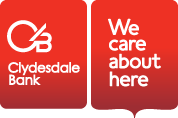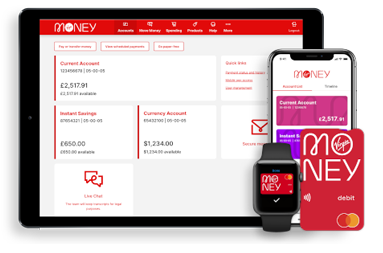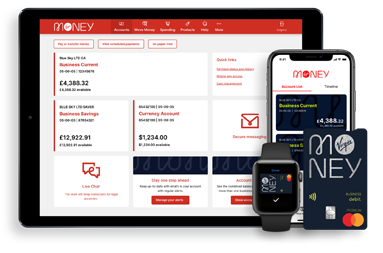Taking back control of your finances
No matter how carefully you plan, sometimes a change of circumstances or unexpected strain on finances can make it harder to meet your commitments. That’s especially true if you have lots of different debt sources, like credit cards, store cards, overdrafts and loans. That means juggling payment dates, amounts and interest rates, which can get really stressful. It’s tempting to ignore it all and hope the situation improves over time. But the chances are that the longer you put it off, the harder it’ll be to get things straightened out. With the right tools and guidance, you might find taking back control is easier than you thought it would be.
Are you starting to struggle with your finances?
It’s not always easy to see when things are getting out of hand. Which is why we’ve made this short checklist — it shows the most common signs of being financially overstretched. They are:
- Struggling to manage or regularly using your overdraft between paydays
- Skipping some bills to pay others
- Making only minimum payments or maxed out on credit cards
- Receiving late payment or debt recovery letters
If you recognise any or all of these signs it’s time to take action. Call our dedicated Financial Care Team on 0800 141 2261. They are available Monday to Friday 8am to 9pm, and on Saturdays from 8am to 5pm. Please note after 6.30pm we are not able to access your mortgage account details and after 7pm we may be unable to access your current account details. Alternatively you might want to contact independent organisations like Citizens Advice Bureau website (opens in a new window) or the National Debtline website (opens in a new window). Information about these organisations can be found in our advice and support section.
Some sources of debt are obvious – like loans, store cards and credit cards. But it can be easy to forget that things like finance plans and credit agreements count too. So remember to think about anything you’re paying up regularly, like a car loan, or a new kitchen, or clothes bought online.
The things people forget to include most often are mortgages and overdrafts. Maybe it’s because they simply feel like part of daily life. Overdrafts can be especially difficult to reduce, particularly if you’re relying on one as a safety net. They need to be tackled as part of a management plan.
Create a debt management plan
We know debt can be stressful, and that it can feel easier to ignore it than to deal with it. But we also know that the sooner you start to tackle the problem, the sooner the situation will improve — and you’ll start to feel better.
There are a few ways to create a debt management plan, either by yourself or with our help. If you want to take control yourself, you can start by following these steps:
- List every debt you owe, and pull together all the information you can about each debt, like payment dates, interest rates and arrears.
- Rank debts in order of importance, putting the most urgent first.
- Think about each debt and write down realistic ways you could manage the repayments in line with your budget.
- Remember to include a regular allowance to help reduce your overdraft, as it won’t be subject to a standard repayment plan.
- Contact your creditors (those you owe money to) and explain the situation and your proposed solution. Most will be happy to work with you to resolve the situation.
If you would like our help, contact our dedicated Financial Care Team on 0800 141 2261. They’re available Monday to Friday, 8am to 9pm, and on Saturdays from 8am to 5pm. Please note after 6.30pm we are not able to access your mortgage account details and after 7pm we may be unable to access your current account details. You might want to contact independent organisations like Citizens Advice website (opens in a new window) or the National Debtline website (opens in a new window) (see advice and support).
Working out a budget
A realistic plan for managing your debts is based on a sensible budget. That means working out your total income, then adding up your expenses. The difference is what you can afford to pay back to reduce your debts.
Ways to make more of your income
When it comes to managing a debt situation, every little helps. So there are a few relatively simple changes you can make, even temporarily, that will ease the pressure on your financial life:
- Staying in is the new going out… cook for your friends rather than paying restaurant prices.
- Shop around for the best deal at the supermarket, maybe try different supermarkets. Also, look at the per unit price of an item.
- Review monthly subscriptions. Do you need Amazon Prime as well as Netflix? Spotify and Google Music? Could your gym membership be pay as you go, rather than a rolling contract, or could you freeze it altogether for a few months? Consider how much you've used your membership every year by not auto-renewing.
While you’re thinking about how to reduce your monthly outgoings, you could also be thinking about how to avoid further debt or expenses, by doing things like:
- Taking lunch to work instead of buying. It’s probably a healthier option too!
- Do grocery shopping online to control spending and check unit prices, rather than special offers.
- Take shopping apps off your phone or tablet.
- Avoid impulse purchases and ‘buy now pay later’ offers.
- Not opening any more credit or store cards or accounts.
- Staying on top of your bank accounts and overdraft to avoid additional charges.
Paying off what you owe
Your debt management plan should think about the most efficient ways to pay everything off and you'll find some ideas below that you can choose from. If you're unsure of which repayment method will work best for you, speak with us on 0800 141 2261 , or seek independent advice from an agency like Citizens Advice Bureau website (opens in a new window) or the National Debtline website (opens in a new window) (see advice and support).
Get advice and support
The most important thing about managing debt is that you act quickly. The situation won’t resolve itself, and there’s plenty of help, advice and support available. You’ll find independent, impartial, confidential advice from organisations like StepChange Debt Charity website (opens in a new window), Money Advice Service website (opens in a new window), National Debtline website (opens in a new window), Business Debtline website (opens in a new window), Christians Against Poverty website (opens in a new window) and your local Citizens Advice Bureau website (opens in a new window).
You can also talk to us on 0800 141 2261 (Monday to Friday - 8am to 9pm, Saturday - 8am to 5pm, please note after 6.30pm we are not able to access your mortgage account details and after 7pm we may be unable to access your current account details) — we understand that sometimes things go wrong, and we’re here to help however we can. And don’t be afraid to contact those you owe money to. Tell them about the situation, and be honest about what you can afford to pay. Contacting them before they’re forced to contact you makes everything easier to deal with.
One last word: remember that you’re not the first person ever to have been in this position. Take action early, be honest with those you owe money to and give them the information they need, form a manageable action plan, and remember we're always here to help you try and get your finances under control.
Got any questions?
Give us a call
-
Prefer to talk to someone?
-
or if you're abroad:
Pop into a branch near you
-
Prefer to speak to someone face-to-face?
You can find impartial information and guidance on money matters on the “MoneyHelper” website.
Clydesdale Bank is covered by the Financial Services Compensation Scheme (FSCS), Find out more.


